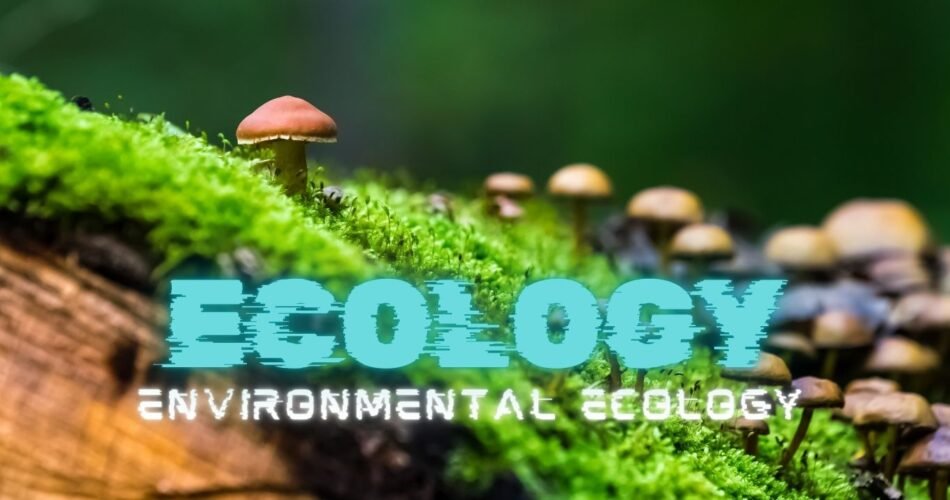This blog contains information about Ecology and Environmental Ecology. In the start, it explains the field of Ecology along with its Types. Then it elaborates the Types of Ecology. It also describes the term Environmental Ecology in detail. Then it mentions some of the Basic Concepts of Environmental Ecology. At the end, It explains Ecology vs Environmental Ecology. This blog explains Ecology, Types, Environmental Ecology, Basic Concepts and Ecology vs Environmental Ecology.
Definition of Ecology:
Ecology can be defined as the study of relationship between the living organisms with their physical environment. It explore how organisms interacts with each other and their surroundings.
Ecology focuses on the understanding of vital connections between plants and animals and the world around them. It helps us to know about human wellbeing and prosperity. This concept provides new knowledge about interdependence between people and nature.
These concepts are really important to understand the natural systems of nature and the existence of living organisms in those natural systems so it tells us how to make their lives better and their environments suitable for them to live in.
Ecology provides us essential basis of nature conservation by provided required knowledge about it. Maintaining the habitats by using the knowledge of ecology can help us to support ecosystems rich with Biodiversity with great quality and prosperity.
We can get plenty of information about extremely valuable Natural resources that needs to saved and conserved in order to maintain or continue the prosperity of the ecosystem and ecological properties of an area according to the needs of organisms and biodiversity found in the certain area.
We will study about Ecology, Types and its discipline called Environmental Ecology with basic concepts in this blog in detail.
Types of Ecology:
Following are the types of Ecology:
Aquatic Ecology:
It is the study of all the living organisms found in water bodies such as freshwater, marine or estuaries. This deals with the relationship of aquatic life with their environments and among the aquatic species
Microbial Ecology:
It deals with the study of microorganisms and their way of living. It keenly studies the interaction of microorganisms with their environment and also with other abiotic constituents found in their habitats.
Terrestrial Ecology:
It is the study of land-based ecosystems, their populations and communities of plants, animals and microbes so it may concern their interaction with atmosphere, groundwater and streams.
Taxonomic Ecology:
It is a new field that concerns with taxonomic data to improve ecosystem study by detecting key entities of a particular area so as it can also utilize taxonomic data for classification of entities on community level.
Systems Ecology:
This branch of ecology uses Computing systems and applied mathematics to predict and study functions in an ecosystem. This may predict and study physical processes and also the energy budgets.
Evolutionary Ecology:
It merges ecology with evolution by studying the genetics and physical changes of an ecosystem and the individuals of ecosystem. It includes predation, competition, parasitism, mutualism etc.
Behavioral Ecology:
It studies the relationship between the behaviors of entities and their offspring. This may also concern to the survival value of the individual associated with the evolution so it helps in understanding behaviors.
Population Ecology:
This branch may concern with the population structures and associated relationships between individuals and populations so it helps in analyzing behavioral patterns of the individuals.
Conservation Ecology:
It deals with the Biodiversity management by Restoration practices and Conservation methods. It also solves the issues like decrease in biodiversity and Natural Resources Exploitation.
Applied Ecology:
It concerns with all the fundamental information about ecology including technical advancements, concepts and principles of ecology and then apply all of them to make specific ecosystem better place for its individuals and all the existing species so it helps in risk reduction, conservation, Natural Disaster Management, etc.
These are the basic Types of Ecology. This blog contains Types of ecology and Environmental Ecology in detail.

Environmental Ecology:
Environmental Ecology is branch of Ecology that deals with the study of interactions between organisms and their Environment. It main focus is to know about interactions, relationships and dependence of organisms with on their environment and the effects of human activities on them.
This branch of ecology deals with the study of processes involved in sustaining ecosystems and their relationships with the human activities and their effects on these systems.
The need of Environmental Ecology is basically finding the solutions of environmental issues and issues that are damaging ecosystems or effecting them negatively in any possible way.
If we study and understand Environmental Ecology, we can get to know the human activities that are harming the ecosystems and so disrupting the natural living of the populations and ecosystems.
Basic Concepts in Environmental Ecology:
Following are the basic concepts in Environmental Ecology:
Sustainability:
Environmental ecology works for attaining sustainability to maintain ecosystems by conserving natural and other types of resources to keep all the ecosystem working well with a long-term operation. This secures the living conditions and also the fundamental needs of future generation by making their ecosystem safe for living.
Carbon Footprint:
Carbon footprint is the carbon consumption and emission by human activities. It relates with Environmental Ecology in a way that it may disturb every ecosystem with high carbon concentrations. It can be tackled with information of this field and also can be reduced by spreading awareness about its negative impacts.
Biodiversity Conservation:
This branch of ecology work for the maintenance and prosperity of living ecosystems huge or smaller against human activities. It makes biodiversity conservation possible by implementing precautionary measures, Mitigation measures and also the Restoration practices to make the ecosystem suitable and also a supporting system for Biodiversity.
Climate Change:
As humans adds such substances into the environment that triggers Climate Change and Global warming. By studying the contribution of man into this so we can take measures to stop or reduce it and also restore our ecosystem with mitigating factors to compensate climate change so this may include restoration, afforestation and such activities.
Regenerative Agriculture:
This includes non-sustainable and inefficient farming practices that are destructing biodiversity and disturbing the ecosystems. Environmental ecology can help us to improve farming practices to avoid loss and also helps us to know about efficient agricultural practices that conserve the biodiversity and also the ecosystem at the same time.
Greenwashing:
Greenwashing is a scam applied by different companies that they are recycling their products and reducing waste production. This should be completely monitored and exposed so we can expose it by using Environmental Ecological information and inquiries. This may be useful for knowing the truth about deceiving companies.
Eco-friendly Products:
Environmental Ecology helps us to know about actual ecofriendly products that helps us to prevent damage in our environment. It tells people about them and so promote its use in environment. By gaining knowledge we can avoid using environment damaging products and also shift to eco-friendly products to reduce the damage in the environment.
Circular Economy:
This economy promotes the systems that targets elimination of wastes and application of 4R strategy (reduce, reuse, recycle and recover). These practices protects the environment from excessive damage. This will be implementation of conservation practices on policy level or system level so this will help to make a huge difference in restoring ecosystems.
Carbon Neutral Concept:
This concept is about preparing and organizing carbon removal systems or strategies to reduce carbon emissions. This field guides us to work on the activities to make them efficient enough to reduce the damage to the ecosystem and so become environmentally sound. These strategies are channelized through the field of Environmental Ecology.
All these concepts concerns with and are noticed by Environmental Ecology in order to make the ecosystems more secure for the populations living in them. Environmental Ecology makes sure to Mitigate environmental issues from an ecosystem by Restoration and Conservation Practices to make the environment suitable for individuals that lives and cherish there. This blog contains Ecology, Types, Environmental Ecology and Basic Concepts.
Ecology vs Environmental Ecology:
Ecology:
- It is the study in which we explore the interactions of living organisms with their environments.
- Its focus is the study of patterns of how organisms interacts with environment in an ecosystem.
- Includes study of ecosystem, specie interactions, biodiversity, and population dynamics.
- It is applied in order to solve ecosystem based problems on a broader scale and so can be theoretical at a great level.
- Example: Research on predator-prey relationship, impact of invasive species on environment. etc.
VS
Environmental Ecology:
- This is the study of effects of human activities on the ecosystems and also the survival or living organisms in the environment.
- Its focus is to study the damages caused by the human activities and solve environmental issues in order to conserve the ecosystems.
- This field of ecology may concern with the environmental issues like climate change, pollution, conservation efforts and concerns like this.
- It is applied to solve human induces environmental impacts on an ecosystem to secure the living organisms. It also helps in conservation of natural resources.
- Example: Research on impacts of Deforestation on Biodiversity, Effects of industrial pollution on Biodiversity etc.
This blog contain Ecology, Types, Environmental Ecology and Basic Concepts.

To learn about more topics, Click the links below:


Comments